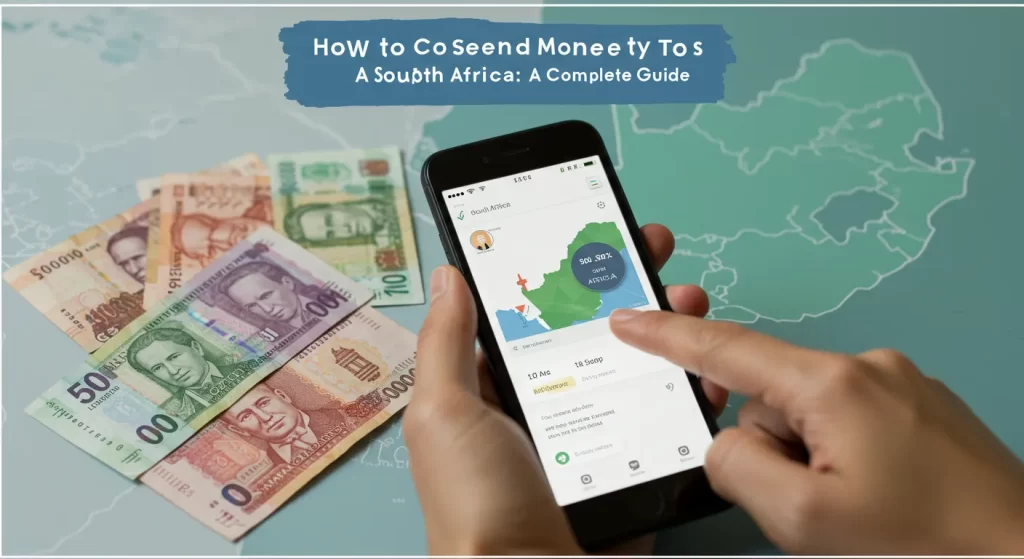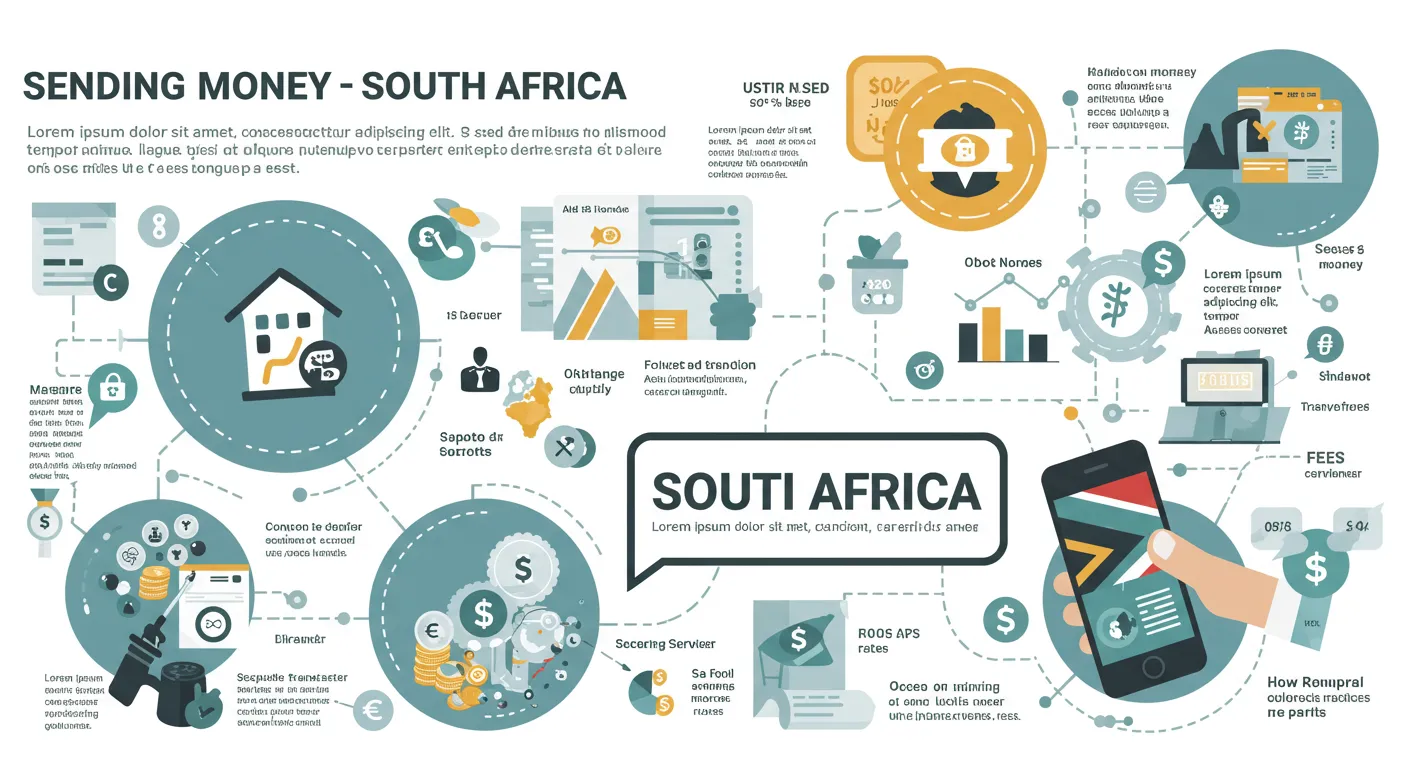Table of Contents
Send money to South Africa has become increasingly simple with the rise of modern digital money transfer services. Whether you’re supporting a loved one, paying for services, or transferring funds for business purposes, choosing the right platform is crucial for ensuring a seamless, cost-effective experience.
In this guide, we’ll explore everything you need to know about sending money to South Africa, from choosing the best money transfer service to understanding exchange rates and fees.
Choosing the Right Money Transfer Service
The first step in sending money to South Africa is selecting the right money transfer service. Several options are available, each with its own set of benefits and drawbacks. Online money transfer services are generally faster, more affordable, and offer better exchange rates than traditional banks. Some popular services include:
- Wise (formerly TransferWise): Known for transparent fees and competitive exchange rates, Wise is a top choice for many. It uses the mid-market exchange rate, ensuring that you get a fair deal. Transfers are quick, often arriving within a few hours or even minutes.
- Remitly: Offers low fees and multiple payout options, including cash pickup and bank transfers. Remitly is ideal for those who need to send money quickly.
- Xe: Specializes in bank-to-bank transfers and offers excellent exchange rates. Xe is perfect for users who want to send large amounts of money securely.
- WorldRemit: Known for its variety of delivery options, including bank transfers, mobile money, and cash pickup, WorldRemit provides a versatile solution for sending money to South Africa.
Traditional options like Western Union and MoneyGram are also available but typically come with higher fees, especially for bank transfers. These services can be useful for cash pickups, but they tend to be more expensive and slower compared to digital transfer services.
Comparing Fees and Exchange Rates

One of the most important factors when sending money to South Africa is understanding the fees and exchange rates involved. Here’s a quick breakdown of what you need to consider:
- Fees: Most money transfer services charge a fee for sending money. Some services charge a flat fee, while others charge a percentage of the amount being transferred. Be mindful of hidden fees, especially those embedded in the exchange rate.
- Exchange Rates: The exchange rate determines how much South African Rand (ZAR) your recipient will receive in exchange for your USD. Aim for services that use the mid-market exchange rate, as this is the most competitive rate. Some services may advertise “no fees” but include hidden costs in the exchange rate markup.
Before sending money, most services will provide an online calculator that shows how much the recipient will receive, factoring in both fees and exchange rates. This can help you make an informed decision.
Essential Information for the Recipient
To send money to South Africa, you’ll need to gather some key information about the recipient. Depending on the service, this information can vary, but here’s a general list of what you’ll need:
- Full Name: As it appears on the recipient’s official ID
- Address: The recipient’s residential address in South Africa
- Bank Account Details: If sending via bank transfer, you’ll need the recipient’s bank name, branch name, account number, and SWIFT/BIC code.
- Mobile Number: Essential for notifications, particularly if the recipient is picking up cash.
- Email Address: Optional, but it can be useful for additional communication.
One important thing to note is that if it’s the recipient’s first time receiving an international transfer, they may need to complete an online Reporting Mandate form as required by the South African Reserve Bank (SARB). This one-time process helps ensure the transfer complies with South Africa’s exchange control regulations.
Also Read: Sam’s Club Using Only Business Credit Card with Just an EIN?
Payment Methods for Send money to South Africa
Once you’ve chosen a money transfer service, the next step is selecting how you’ll fund your transfer. Various payment methods are available, and each has its pros and cons:
- Bank Transfer: Typically the most affordable option, although it may take a few business days to process.
- Debit Card: Faster than a bank transfer, usually with low fees.
- Credit Card: Quick but often comes with higher fees, and your bank may charge a cash advance fee.
- Wire Transfer: Extremely fast but often comes with higher fees, especially with traditional banks.
You may also be able to use funds from an existing account with your money transfer service (like a Wise multi-currency account), which can simplify the process and sometimes reduce fees.
Step-by-Step Guide to Sending Money Online

Let’s walk through the typical process of Send Money to South Africa using an online money transfer service:
- Create an Account: If you don’t already have one, sign up for an account with your chosen provider (such as Wise, Xe, or Remitly).
- Verify Your Identity: For security purposes, you’ll need to upload a photo of your ID and possibly a selfie.
- Start the Transfer: Choose South Africa as your destination country and enter the amount you want to send.
- Enter Recipient Details: Provide the recipient’s full name, address, and bank account information.
- Select Your Payment Method: Choose how you’ll fund the transfer (e.g., bank transfer, debit card, or credit card).
- Confirm and Pay: Double-check all the details and confirm the transfer. Follow the instructions to complete your payment.
- Track Your Transfer: Most services will provide a tracking number so you and your recipient can monitor the transfer’s progress.
Navigating SARB Regulations and Compliance
For first-time recipients in South Africa, it’s important to understand the regulatory requirements imposed by the South African Reserve Bank (SARB). SARB requires recipients to complete a one-time Reporting Mandate form, which may include providing proof of identity and their bank account details. Failing to complete this process can result in delayed or rejected transfers.
In addition to the Reporting Mandate, international transfers into South Africa require a Balance of Payments (BoP) code, which helps explain the purpose of the transfer. Be sure to consult with your money transfer service for guidance on this process.
Transfer Fees and Processing Time

The fees for transferring money to South Africa vary depending on the provider, the payment method, and the transfer amount. Traditional banks often charge higher fees, including intermediary bank fees, and they may offer less favorable exchange rates. In contrast, digital services like Wise, Xe, and Remitly tend to have lower fees and better rates.
Processing time also varies. Bank transfers can take 1-5 business days, while online services can transfer funds in minutes or hours, depending on the method and provider you choose.
Avoiding Fraud and Scams
As with any financial transaction, there’s a risk of fraud when sending money to South Africa. To protect yourself:
- Only send money to people you know and trust.
- Be cautious of unexpected requests for money, especially if they seem urgent or suspicious.
- If in doubt, independently verify the request.
It’s also advisable to avoid using informal money transfer methods, such as sending money through a friend, as these carry significant security risks.
Sending Money to South Africa Made Simple
Send money to South Africa is now easier than ever, thanks to the wide range of digital money transfer services available. By choosing the right service, understanding fees and exchange rates, and ensuring the recipient provides accurate information, you can ensure that your transfer is smooth and efficient.
Keep in mind the regulatory requirements set by SARB, and always prioritize security to avoid scams. Whether you’re supporting family, paying for services, or sending a gift, following these steps will make the process hassle-free.
In the end, the key to a successful transfer lies in careful planning. Take the time to research different services and compare their rates, speed, and security measures before making your decision. By doing so, you’ll ensure that your money reaches its destination in South Africa quickly and safely, with minimal hassle.
FAQs
How can I send money to South Africa quickly?
You can send money to South Africa quickly using services like Wise, Remitly, or Xe, which offer fast bank transfers and cash pickups within minutes to hours.
Are there fees for sending money to South Africa?
Yes, fees vary by provider. Online services like Wise and Xe offer competitive fees, while traditional banks tend to have higher charges and less favorable exchange rates.
What do I need to send money to South Africa?
You’ll need the recipient’s full name, address, bank details (if applicable), and in some cases, proof of identity for first-time transfers to comply with SARB regulations.

